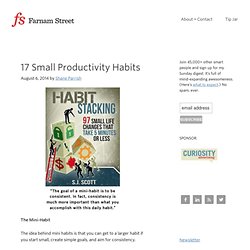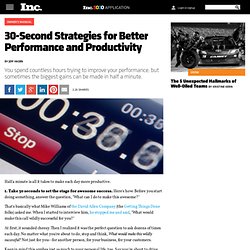

17 Small Productivity Habits. The Mini-Habit The idea behind mini habits is that you can get to a larger habit if you start small, create simple goals, and aim for consistency.

In his book Mini Habits: Small Habits, Bigger Results, Stephen Guise gives the example of “The One Pushup Challenge.” He was doing what a lot of us do. Feeling guilty about not working out, he tried to fit years worth of exercise into the first workout which created an all or nothing attitude (not to mention a focus on goals and not process.) Well, one day he decided to do the opposite. In Habit Stacking: 97 Small Life Changes That Take Five Minutes or Less, author S. The core idea behind the mini-habits concept is that you can build a major habit by thinking small enough to get started. Habit-Stacking The purpose of habit-stacking is to create simple and repeatable routines (managed by a checklist). According to Scott there are 8 Elements of a habit-stacking routine. 17 Small Productivity Habits #1 Drink a Large Glass of Water #2. . #3. . #4. 30-Second Productivity Strategies. Half a minute is all it takes to make each day more productive. 1.

Take 30 seconds to set the stage for awesome success. Here's how: Before you start doing something, answer the question, "What can I do to make this awesome? " That's basically what Mike Williams of the David Allen Company (the Getting Things Done folks) asked me. When I started to interview him, he stopped me and said, "What would make this call wildly successful for you? " At first, it sounded cheesy. Keep in mind this applies just as much to your personal life, too. Don't just move blindly on to the next task. Answer that question, and whatever you do, you will do a lot better. 2. Unfortunately, all too often you forget what happened. 5 Unusual Tricks For Actually Reaching Your New Year's Goals. With the new year rolling around, most of us are planning ways to improve our health, set some big goals, and finally achieve things we have been putting off for a while.

But when you look at the statistics, almost 80% of people will fail by the springtime, and after a year, only a smaller percentage of people are still involved with their goals at all. So here’s how to be that tiny percentage of people that are still going strong a year later. #1 Follow intrinsic motivation… rather than forcing yourself. Let me ask you this: do you think the typical person who just begins working out during the new year will still be exercising if: They’re intrinsically motivated (they like it)They’re forcing themselves to do it by using rewards (money/food), punishments, etc. Can you guess which one? The first! Although your friend may be slimming down quicker than you after spending 5 hours a week pounding it out in the gym, see if they’re still exercising in 1-2 years when it really matters.
Manage Your Energy. Making great ideas happen Using your skills T3 Level 1 & 2 Powerpoint. How to Decide on a Career (Even If You Don’t Know What You Want) Choosing the right career is tricky.

Economist Neil Howe estimates that only five percent of people find a good career match on the first try. And even beyond this chilling stat, there’s so much external pressure to land the perfect job, follow your passion and be super successful by the end of your 20s. No wonder most people break into a cold sweat when asked, “What do you want to be when you grow up?” But deciding on a career can be simplified into three basic problems. Conquer these, and you’ll dramatically up your chances of finding the job that’s right for you. Problem #1: You Don’t Have Enough Information There are literally thousands of careers out there—some of which could be at the perfect junction of what you’re good at, what you love and what’s in demand. To combat this problem, try this: devote one hour every day for a week (or heck, a month!)
This minimal routine will skyrocket your list of career ideas. Problem #2: You Don’t Know What You Want A. B. C. D.